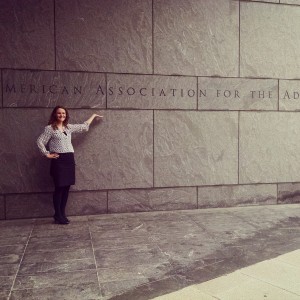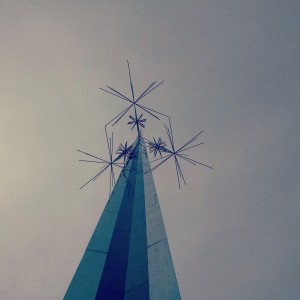May 14, 2015
Making My CASE
Posted by elandau
This blog post was written by Annie Putman, a Ph.D. student in the Geology and Geophysics Department at the University of Utah.
Once the excitement of receiving my acceptance from AGU to attend the American Association for the Advancement of Science (AAAS) Catalyzing Advocacy in Science and Engineering (CASE) Workshop in Washington subsided, I faced up to the next hurdle: a trip to the mall to supplement the flannels in my field wardrobe. Josh, a young, sharply dressed sales assistant at J. Crew rescued me from the retail wilderness, and did his best to ensure that I looked good for Capitol Hill. 
Fast forward to D.C., where the cherry blossom petals and tourists taking selfies littered the green spaces in the epicenter of national politics and policy. I still felt uncertain, but disguised in the new pants and a hidden layer of sparkly toenail polish, I sidled up to a fellow student at the CASE mixer. Those first words more than broke the ice. They burst an ice dam and outflowed a cool virtual river of science policy talk and networking. A Jökulhlaup, in Earth science speak.
Understanding the discretionary budget, with specific focus on science funding, was our first workshop task. In groups we crafted appropriations budget proposals for the Commerce, Justice, and Science subsections that we thought would be acceptable to Congress and the president. My group chose the most objective route to decide our appropriations: We took the simple average of the funding requests put forth by the House, the Senate, and the President. But because of our subjective investment in science, we nudged the budget of NOAA, NIH, and NASA up to the highest amount we thought would pass. My fellow conference attendees found this process straightforward. Unlike our elected officials, we don’t have agreements with stakeholders or constituents to please.
The second day began at the U.S. Capitol Visitors Center. Our first speaker, a specialist on Congress, Judy Schneider, teased us through the tangles of congressional committees. The group oscillated between laughing uproar and nervous silence in response to her questions and proclamations. She hammered home the idea that politics is local—having a relationship, an ongoing dialogue, with your local lawmaker is how you get your voice heard. Her lively presentation helped me realize exactly how complex the decision structure is for Congress, and why it can be so thorny.
At an afternoon session at the AAAS building, we heard from Jeanne Braha, an expert in science communication and the public engagement manager at AAAS. She introduced us to The Upgoer Five from the webcomic XKCD, which uses words like “thing” and “stuff” to describe the parts of a modern space ship, also known as the “only flying space car that’s taken anyone to another world.” The space car example drives home the point that we can distill our jargon into something digestible by a nonscientist. Knowing how to communicate with our legislators and the public is a critical part of science advocacy.
Finally, we were challenged to say why science matters to us. There are many answers to this difficult question. Science matters because researching and understanding science allows people to engage with the world in ways that shed light on the how and why. Science is the foundation of progress. Science  can save lives. For me, science matters because it is a tool we use to investigate a place we call our home. The more I know about the natural history of a place, the more precious it is to me.
can save lives. For me, science matters because it is a tool we use to investigate a place we call our home. The more I know about the natural history of a place, the more precious it is to me.
The CASE Workshop made some things as clear as glacial water: There’s a lot more to Congress than snowball throwing, and making decisions that have national effects is trickier than taking a simple average. I was gratified to hear that Congress thinks scientists have integrity and offer valuable insights, and that most of our senators and representatives want to have relationships with us.
I left CASE feeling like there are opportunities for scientists like me to take part in political discourse by communicating clearly and, perhaps, dressing the part. As I continue my research on the water cycle, I will incorporate science advocacy as part of the broader impacts of my scientific findings by engaging my local and state lawmakers on issues of water security in Salt Lake City and Utah.
About the author: I study how changes to modern climate affects the water cycle, using stable isotopes of hydrogen and oxygen in precipitation. I’m interested in how the isotopes change regionally and globally, on event to decadal timescales.
Are you an AGU member student who would like to attend a future CASE Workshop? Let us know at sciencepolicy [at] agu.org.

